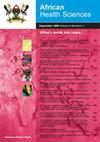Problem gambling among secondary school adolescents in Enugu, Nigeria
IF 0.9
4区 医学
Q3 MEDICINE, GENERAL & INTERNAL
引用次数: 0
Abstract
Background: Adolescent problem gambling is a common behavioural issue and could be associated with internet addiction. Objectives: To determine the pattern of problem gambling and factors that predict gambling among adolescents that attendedsecondary schools in southeast Nigeria. Methodology: This is a cross-sectional study design. A three-stage sampling technique was used to select 796 secondary schooladolescents from eight secondary schools in Enugu State, Nigeria. Results: The highest proportion of the respondents, 38.3% had problem gambling with negative consequences. There was aweak positive correlation between gambling severity index and internet addiction. (n=796, r=0.254, p<0.001). There is a veryweak negative correlation between gambling severity index and age in years. (n=796, r= -0.034, p=0.331).The male respondents were 1.5 times more likely to have problem gambling when compared with the females, (AOR=1.5;(95%CI: 1.1-2.0). The respondents who have internet addiction were 3.5 times more likely to have problem gambling whencompared with those who do not have an internet addiction, (AOR=3.5; 95%CI: 2.6-4.8). Conclusion: The prevalence of gambling among adolescents is high. Adolescents who had problem gambling also had internetaddiction. The male respondents were more likely to have problem gambling than their female folk. Keywords: Problem gambling; secondary school; adolescents; internet addiction; gambling severity index.尼日利亚埃努古中学青少年的赌博问题
背景:青少年问题赌博是一种常见的行为问题,可能与网络成瘾有关。
目的:确定问题赌博模式和预测尼日利亚东南部中学青少年赌博的因素。
方法学:这是一个横断面研究设计。采用三阶段抽样技术,从尼日利亚埃努古州的八所中学中抽取796名中学生。
结果:受访者中有不良赌博行为的比例最高,为38.3%。赌博严重程度指数与网络成瘾呈弱正相关。(n=796, r=0.254, p<0.001)。赌博严重程度指数与年龄呈极弱负相关。(n=796, r= -0.034, p=0.331)。男性受访者有赌博问题的可能性是女性的1.5倍(AOR=1.5; 95%CI: 1.1-2.0)。有网瘾的受访者有赌博问题的可能性是没有网瘾的受访者的3.5倍(AOR=3.5;95%置信区间:2.6—-4.8)# x0D公司;结论:青少年赌博患病率较高。有赌博问题的青少年也有网瘾。男性受访者比女性受访者更有可能出现赌博问题。
关键词:问题赌博;中学;青少年;网络成瘾;赌博严重程度指数。
本文章由计算机程序翻译,如有差异,请以英文原文为准。
求助全文
约1分钟内获得全文
求助全文
来源期刊

African Health Sciences
MEDICINE, GENERAL & INTERNAL-
CiteScore
2.30
自引率
0.00%
发文量
179
审稿时长
>12 weeks
期刊介绍:
The African Health Sciences is an internationally refereed journal publishing original articles on research, clinical practice, public health, policy, planning, implementation and evaluation, in the health and related sciences relevant to Africa and the tropics. Its objectives are to: Advocate for and promote the growth of reading culture in sub Saharan Africa; Provide a high quality journal in which health and policy and other researchers and practitioners in the region can and world wide, can publish their work; Promote relevant health system research and publication in the region including alternative means of health care financing, the burden of and solution of health problems in marginalized urban and rural communities amongst the displaced and others affected by conflict; Promote research and the systematic collection and collation and publication of data on diseases and conditions of equity and influence; Promote development of evidence-based policies and guidelines for clinical, public health and other practitioners. African Health Sciences acknowledges support provided by the African Health Journals Partnership Project that is funded by the US National Institutes of Health (through the National Library of Medicine and the Fogarty International Center) and facilitated by the Council of Science Editors.
 求助内容:
求助内容: 应助结果提醒方式:
应助结果提醒方式:


